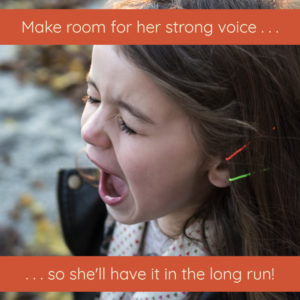Many parents — and you may be among them (as I once was) — feel irritation (or something even stronger) when their child says “No!” or otherwise signals their unwillingness to cooperate. Rather than staying frustrated, however, let’s uncover how we parents often make that refusal harder than it needs to be, why “No” is something we want our child to learn to say with conviction, and a way you can make room for “No” and cooperation in your child’s life.
The wrong way to handle “No!”
Here are three common problems I see parents make when their child says “No!” to the adult’s request or instruction.
- Problem 1: Treating “No!” as an absolute “Never!” In all honesty, “no,” from our child is often more nuanced than our interpretation. Part of our frustration comes from hearing a level of definiteness that often isn’t really there. Our child’s “No” can mean “not now,” “I’m really enjoying what I’m doing and I’m not ready to shift gears,” or “That doesn’t sound like a great idea to me,” and more.
- Problem 2: Taking our child’s “No!” personally. Though we don’t like to admit it, most parents have some energy invested in our child “showing up” a certain way in the world. This can make us overly attached to our child saying “yes,” and churn up our internal (and often unconscious) fears about what their resistance means about them and us.
- Problem 3: Reacting to “No!” with logic. Avoiding explanations (or at least delaying them) can seem counter-intuitive for some, yet the truth is that our child’s “No!” can often have an emotional component that isn’t changeable by even the most sound reasoning. Though logic is a common route parents take when our child resists, it can often make the resistance persist.
Of course, if you want better tools and confidence for eliminating the root causes of “No!” (without taking away the benefits “No!” provides our children), then you need more information, effective guidance, and plenty of chances to put new knowledge into practice. My Cooperative Home Coaching Program gives you precisely that.
The Cooperative Home Coaching Program includes
- Eight weeks of training videos, exercises, and workbook materials in bite-sized pieces. This format keeps you moving with learning and growth rather than overwhelming you or leaving you to go through it alone.
- Closed Facebook group for peer and coach support. This allows you to ask questions as you go and not flounder or get confused when things don’t make sense or you hit bumps in putting learning into practice.
- Live Q&As and coaching in the FB group. So you stay inspired and implementing.
- One-on-one coaching session. You get “face time†with me so we can address and troubleshoot your specific situation, concerns, or challenges.
- I’ll also have some valuable fast-action bonuses for the first people to pay their registration once the doors open.
You will learn . . .
- The reasons children say “Yes” AND why they say “No.”
- What you’re likely doing that triggers their instinct to resist.
- How certain resistance is crucial for your child’s long-term well-being.
- The “hidden” factors in your own child’s life that make it easy for him to resist you.
You will have the opportunity to practice . . .
- Engaging your child’s natural impulse to listen to you and say “yes” to your direction.
- Strengthening your child’s cooperative abilities and safeguarding their confidence in saying “No” when it does really matter.
- Diffusing tensions when your child is in a full on “No!” to you.
- And much, much more!
Click here for details, including the chance to join the priority notification list for advance access and special pricing.
Your child needs “No!” now and in the future
 Though we can wish we didn’t have to deal with our children’s resistance, the impulse underneath “No!” has many important benefits we do want our children to have. Here are a few:
Though we can wish we didn’t have to deal with our children’s resistance, the impulse underneath “No!” has many important benefits we do want our children to have. Here are a few:
- Having the backbone to withstand peer pressure, bullying, and other coercion from their friends and classmates.
- Being able to set — and hold — boundaries about how they let others treat them.
- Giving them the courage to stand up for their values and follow their dreams despite obstacles.
So quashing the “No!” in their younger years would weaken them for the long-term even though it seems like eliminating it would be better for us today. If you’re not willing to sacrifice their future AND you’d like today to be a bit easier, my Cooperative Home Coaching Program may be precisely the resource you’ve been seeking.